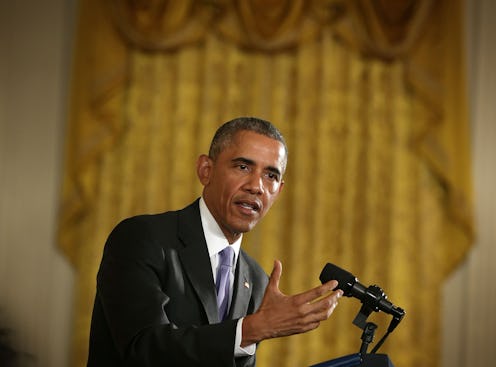News
Obama Opened A Conversation About Male Rape
For months, Bill Cosby has remained in the headlines as more and more women — over 30 at the time of this writing — have come forward with allegations about multiple alleged instances of being drugged and sexually assaulted. On Thursday, in a press conference that began with comments about the nuclear deal with Iran, President Obama answered questions about whether or not the White House would revoke Cosby's Medal of Freedom. In his remarks, President Obama broached the topic of male rape, which is not an issue often mentioned in general, and certainly not by presidents. While brief, the president's comment will hopefully help broaden the discussion about rape to include all victims of sexual assault.
The comment about men and rape was pretty subtle, but important nonetheless. Obama stated, "If you give a woman — or a man, for that matter — without his or her knowledge a drug and then have sex with that person without consent, that's rape."
The president went on to say that "this country, and any civilized country, should have no tolerance for rape." This latter comment was far more pointed than the first, and established the president's personal stance on the issue of sexual consent. And while he didn't come right out and say it, presumably for legal purposes, the president's comments amount to agreeing with celebrities and the public like that Cosby's alleged behavior amounts to rape.
Just as important as the veritable condemnation of Cosby was Obama's addition of men to the conversation about victims of rape and sexual abuse. When we have high-level discussions about rape and rape culture, we focus on women for a good reason: according to the Rape, Abuse, Incest National Network (RAINN), 17.6 percent of American women are the victims of attempted or completed rape, while 3 percent of men are victims of attempted or completed rape. This supports the fact that men in fact do get raped, and as such deserve advocacy, resources, and acknowledgement of these crimes against them.
Often, we picture rape as a snatch-and-grab situation where a cisgender heterosexual man physically overpowers a cisgender woman and forces her to have penetrative sex. We imagine that men are typically stronger than women, and therefore women are the only people capable of being raped. There are a lot of assumptions at play here that erase not only the rape of cis men, but also of trans* and non-binary individuals.
But if we think about rape in terms of consent, and not only in terms of physical force (and let me clarify now that there are plenty of women who are stronger than men) the way Obama did, we can see that there are many ways that rapists assault their victims, and that people of all genders can be raped. To illustrate using Cosby's alleged crimes, he is accused of drugging his victims to rape them; this is something that could happen to anyone regardless of gender.
While men are not as frequently affected by rape or sexual assault as women, there's still a need to include them in the conversation about rape. It is also necessary to include other genders when we talk about rape, and make sure that all rape survivors have access to resources. President Obama's brief remarks didn't take the topic quite this far, but hopefully it opened the door for a more inclusive conversation about rape victims in the U.S.
Image: Getty Images (2)
